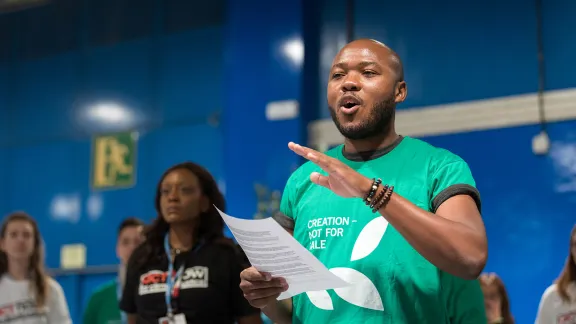
LWF Council member Khulekani Sizwe Magwaza advocating for climate justice during COP25 in Madrid, Spain, in 2019. Photo: LWF/Albin Hillert
Climate Justice Charter presented to South African Parliament
This year’s National Day of Action in South Africa called for an “end to hunger, thirst, pollution and climate harm.” On this occasion, representatives of civil society, including faith-based organizations and churches, advocated for climate justice. On their behalf the Southern African Faith Communities’ Environment Institute (SAFCEI) was part of the group that handed over the Climate Justice Charter to parliament.
This charter is the result of a six-year process led by the South African Food Sovereignty Campaign (SASFC). Among others, it refers to climate justice as a prerequisite for intergenerational justice. It states, “Care for our planetary commons and ecosystems is crucial for intergenerational justice; to secure a future for our children, youth and those not yet born.“
The charter states that we are all living under the same conditions, and climate change is threatening all of us. Churches and faith communities emphasized the connectedness of all creation: humans, plants, animals, rivers, oceans, and forests. The effects of climate change threaten our shared future, and young people cannot ignore this threat.
By 16 October 220 organizations had endorsed the Climate Justice Charter, including trade unions, community organizations, faith communities, youth groups and women’s organizations. On the National Day of Action, 68 communities across South Africa demonstrated their demands for climate justice to the government by picketing, painting murals, hosting workshops, undertaking peaceful marches, organizing feeding programs or cleaning illegal dumping sites.
I was one of the youth and young leaders who participated in the formal handover of the Climate Justice Charter to parliament. Among others, it calls on the government to
- raise awareness for and advance climate consciousness,
- promote responsible living with nature,
- increased solidarity with climate-vulnerable communities,
- consider the protection of human rights as an aspect of climate justice.
The group presenting the charter to parliament also emphasized that the global health crisis caused by COVID 19 did not put the climate crisis on recess. Instead, it worsens many social ills in our society.
Many health risks arise from increased planetary temperature, increased extreme weather shocks such as droughts, floods, wildfires, and heatwaves. Adding to this, the Coronavirus pandemic has deepened inequalities in society. The poor are becoming poorer, and vulnerable people are suffering from increased difficulties and risks.
Concerning the wellbeing and equity of current and future generations, who will most likely face difficult living conditions in a changing climate, I am grateful to belong to a member church of the Lutheran World Federation (LWF) and a global communion of churches. LWF promotes intergenerational justice by ensuring the full, equal, and meaningful participation of youth in all activities, processes, and platforms, including those relating to climate action.


